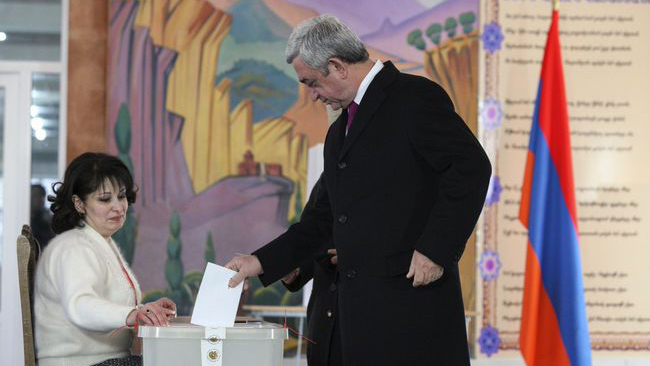“An adventure impregnated with unpredictable repercussions”
Armenia votes for parliamentary-presidential republic in a referendum. Is it to continue the sitting president’s powers?
Armenia held a constitutional referendum on proposed changes to the country’s fundamental law. In October, the parliament approved transition from presidential-parliamentary to parliamentary order. The proposal met with a mixed reception among the public, and then it was decided to address the people as the source of power.
According to the Central Election Commission, the proposed amendments were backed by more than 63 percent of voters, with the turnout of 53 percent.
According to the now endorsed draft constitution, the president’s term of office increases from five to seven years, the head of the state will be elected not in a general election, but by the electoral college, which will consist of MPs and representatives of local self-government. Besides, the president may not be member of any political party, and can only be elected once.
The effective power in the country is transferred into the hands of the prime minister, who will be nominated by the parliamentary majority, with subsequent appointment by the president. According to the draft, in the event of war the prime minister is the commander-in-chief of the country’s armed forces, which are subordinated to the government.
Although this appeal to voters has a very democratic appearance, in fact (and this is an open secret both in Armenia and abroad), the amendments to the constitution are supposed to help the incumbent Serzh Sargsyan’s regime in power. Sargsyan was elected in February 2008 and re-elected in 2013. The current constitution bans a third re-election, whence the need to amend it. This awkward restriction is a pain in the neck for many a leader in the post-Soviet states. Due to Armenia’s peculiarities, government did not dare to simply cancel the maximum-two-terms provisions and opted instead for a more complicated, yet seemingly safer path.
The maneuver was met with a strong rebuff. In late November there were calls to boycott the referendum, and on December 1 protest actions began in Yerevan.
And although observers (most of whom came from friendly states) have not revealed any grave violations at the polls, there are suspicions that the regime has rigged the vote.
Little wonder that even before the closing of the polling stations, protesters began to gather in the center of the Armenian capital.
There were violations during the referendum, said Armen Martirosyan, deputy head of the opposition party Heritage. He accused the regime of “all kinds of falsifications” of the outcome. The leader of Heritage Raffi Hovhannisyan said that his movement demanded that the incumbents resign.
Both former presidents of Armenia spoke against the new constitution, too. Levon Ter-Petrosyan dismissed the constitutional referendum as an “adventure impregnated with unpredictable repercussions.” The second president of Armenia, Robert Kocharyan, said in an interview to Deutsche Welle that “the draft of the constitution contains substantial risks of sinking into a de-facto one-party system, and consequently, into political monopoly and stagnation.” In his opinion, the constitution attaches the obligatory parliamentary majority to one certain party, thus eviscerating the very essence of parliamentarianism.
Whatever the outcome of the current protests, it is obvious that society is accumulating protest potential. On the other hand, many people display little interest in such seemingly abstract documents as the constitution. They do not really care what kind of state will Armenia be, presidential or parliamentary. Life is hard at the moment, therefore political battles seem to many a distant game.
The regime might have won this round, but the future bodes it no good. Armenia came too close to the point of outburst. The government still has some time to respond – but this time is running out.
Newspaper output №:
№74, (2015)Section
Topic of the Day





